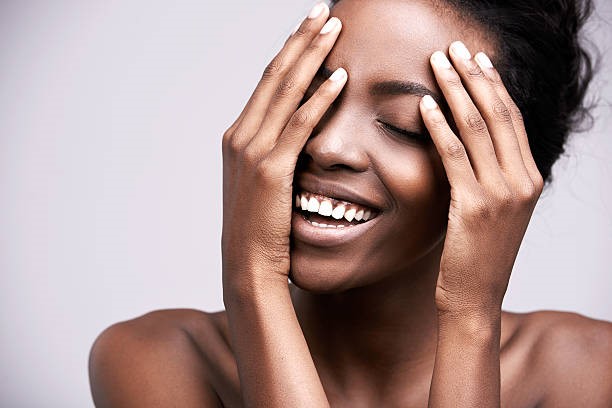AN-Conseils de soins de la peau noire
Skin care tips for dark skin

People with dark skin are more frequently confronted with certain skin problems, such as hyperpigmentation, inflammation, sensitivity to lasers, etc.
Skin care tips for dark skin
Chances are, if you have a darker complexion, a pimple has disappeared just to have a flat, deeply pigmented spot take its place. This post-inflammatory hyperpigmentation is the result of trauma triggering pigment cells, and is more likely to occur in people with darker skin.
Inflammation goes hand in hand with pigmentation because they are close to each other and stimulate the inflammatory cells. The proximity of the pigment cells to the inflammatory cells is what further activates the cells.
Due to genetics, people with melanin-rich skin are more likely to suffer from certain skin conditions. These include:
Keloids and hypertrophic scars: The morphology and location of our pigment cells are different from those of other skin types. With keloids and scars, our fibroblasts and collagen cells are also more reactive. This makes hypertrophic scars and keloids more difficult to remove because our healing process never stops.
Dermatoses papulosa nigra: These small brown spots or bubbles are simply genetically associated with those who have darker skin, just as freckles are associated with people with fair skin and red hair. It’s definitely genetics that makes us more prone.
Ashy skin: while anyone can be ashy, the darker your skin, the more likely you are to see it. When skin is dry, it develops grey and white surface patches which are simply more visible on darker skin because there is more contrast. The solution: Vaseline, paraffin.
People with darker skin tones and melanin-rich skin have inherent sun protection in the range of 8 to 13, so they don’t burn as easily and experience skin ageing that starts at an older age and in different, less noticeable ways.
Because of these factors, there is a widespread myth in communities of colour that sunscreen is unnecessary and only for fair-skinned people. Many studies have shown the danger of late diagnoses of skin cancer for people of colour and the importance of wearing sunscreen is clear.
Since there are stylish chemical and physical sunscreens available today, there is no excuse for not finding the right product for everyday use. Sunscreen is essential for the treatment of any discoloration, as the sun has a major influence on hyperpigmentation and melasma. The SPF should be between 30 and 50.
When it comes to treating dark spots, an ounce of prevention is worth a pound of cure, and that means treating the inflammation, as soon as possible. As soon as the first pimple appears, it should be treated more aggressively so as not to leave any dark marks.
The cause of the inflammation must be diagnosed and then treated with targeted therapy. Acne inflammation is controlled with topical and oral antibiotics, retinoids, benzoyl peroxide and hydroxy acids such as salicylic acid.
Once the inflammation has been treated, you can reduce the appearance of brown spots by using tranexamic or azelaic acid which also works on acne, retinoids also work very well.
There are also options such as vitamin C, which has been shown to break down skin colour pigments and slow down the ageing process. But be sure to avoid anything with very high percentages of acids.
In terms of proven procedures for fading brown spots, chemical peels and microdermabrasion are traditional treatments that women can turn to. Chemical peels chemically break down the pigment in the skin and microdermabrasion mechanically breaks down the pigment.
When it comes to laser hair removal for darker skin types, the 1064 Nd:YAG laser stands out. This laser targets the pigment in the hair and avoids the pigment in the skin so that there is no blistering or scarring associated with the procedure.
When undergoing laser hair removal, it is essential to consult a professional experienced in treating darker skin types. Remember that laser hair removal is advanced laser surgery and that the operator of the device is just as important as the choice of the appropriate laser.
Caring for darker skin doesn’t stop at the neck. Treat the skin on your body like the skin on your face: cleanse, tone, moisturise and treat it.
As anyone with natural hair will tell you, it’s important to find a hairdresser who feels comfortable and at ease taking care of your curls. Needless to say, the same goes for your skin.
The best thing you can do is to find someone who has expertise in skin of colour. When you make your appointment, ask if the dermatologist is used to treating darker skin.
